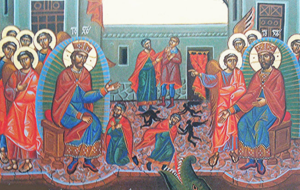The Parable of the Unforgiving Servant
(Matthew 18:23-35)

This parable where the servant whose debt is forgiven by his master, but does not himself forgive the debt owed to himself, emphasises the centrality of forgiveness in a Christian’s life. What is the debt owed by the servant to the king? Jesus gives the answer with the greatest commandment “You shall love the Lord your God with all your heart, with all your soul, and with all your mind” (Matt 22:37). The debt is the inequality of love between God and man. Simply put, He loves us much more than we love Him. Our passions and weaknesses prevent us loving God as we should.
Once again God shows the enormity of His love and compassion when He forgives the servant’s debt completely. St John Chrysostom remarks “What power prayer has! This debtor … only asked his Lord, then he succeeded in inclining him to mercy. Let us not weaken in our prayers.”
The servant “went out” from his state of humility and repentance, forgetting about God and the great miracle of forgiveness he had just experienced. He finds one of his fellow servants who owed him a trivial amount. The fellow servant begs him, using the identical words the first servant had used with the king. However, the response was very different. Instead of compassion, harshness. Instead of forgiveness, exacting judgement. Instead of love, cold heartedness. We want to be forgiven, yet find it hard to forgive others. The prerequisites of forgiveness are avoidance of anger, of judging others and holding grudges. Forgiveness is a mindset, a continuous way of life.
Finally, the king says “Should you not also have had compassion on your fellow servant, just as I had pity on you?” (verse 33). This is the heart of the kingdom of God. If we ask for mercy, He gives us much more than we ask for. Many times, ungrateful as we are, we don’t appreciate or remember this mystery of forgiveness. God wants us to treat other people the same way that He treats us. Then, we enter into the deep meaning of the Lord’s Prayer “forgive us our debts as we forgive our debtors” (Matt 6:12).
Source: Lychnos August–September 2020
